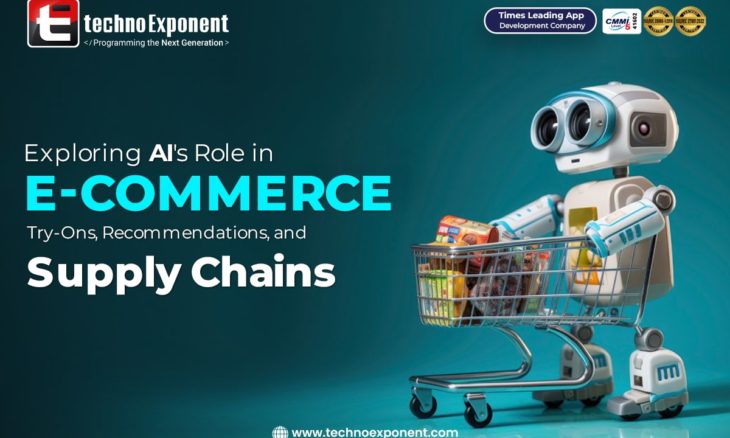
Introduction
The landscape of e-commerce has been dramatically reshaped by AI-driven solutions. This transformative technology has revolutionized various aspects of these industries, ranging from customer interactions to supply chain management. In this blog, we will explore the profound impact of AI on e-commerce, focusing on virtual try-ons, personalized recommendations, and supply chain optimization, as well as discussing challenges, considerations, and future trends.
AI’s Impact on E-Commerce
The emergence of e-commerce AI applications has significantly influenced the e-commerce sectors, enabling businesses to enhance customer experiences, streamline operations, and drive sales growth. Three key areas where AI has made a significant impact are virtual try-ons, personalized recommendations, and supply chain optimization.
Virtual Try-Ons
Virtual try-ons have revolutionized the way consumers engage with products. By leveraging AI-driven solutions, customers can visualize how products would look on them before making a purchase. This capability eliminates the need for physical try-ons, offering convenience and enhancing the overall shopping experience. Whether it’s trying on clothes, accessories, or even furniture, virtual try-ons provide customers with confidence in their purchasing decisions.
Successful implementations of virtual try-ons can be seen across various industries. For example, beauty brands utilize augmented reality (AR) apps to allow customers to try on makeup products, while fashion offers virtual fitting rooms to try on clothing virtually. These implementations not only drive customer engagement but also lead to higher conversion rates and reduced return rates.
Personalized Recommendations
AI algorithms play a crucial role in delivering personalized recommendations to consumers in the e-commerce sectors. By analyzing vast amounts of data, including browsing history, purchase behavior, and demographic information, AI can predict and suggest products that align with each customer’s preferences and needs.
Personalized recommendations enhance the customer experience by providing tailored suggestions, ultimately increasing customer satisfaction and driving sales. For instance, e-commerce giants like Amazon and Netflix leverage AI algorithms to deliver personalized product and content recommendations, resulting in higher engagement and conversion rates.
Supply Chain Optimization
AI-driven supply chain optimization is another significant area of impact in e-commerce. By harnessing supply chain optimization with AI such as machine learning and predictive analytics, businesses can optimize various aspects of the supply chain, including inventory management, logistics, and demand forecasting.
The benefits of supply chain optimization are manifold, ranging from reduced costs and improved efficiency to faster delivery times and enhanced customer service. Amazon implemented AI-driven supply chain optimization strategies, enabling them to streamline operations and stay ahead of the competition.
Challenges and Considerations
Despite the numerous benefits of AI-driven solutions in e-commerce, there are several challenges and considerations that businesses must address. These include concerns related to data privacy, integration with existing systems, and the need for skilled personnel to implement and manage AI solutions effectively.
Ensuring the security and privacy of customer data is paramount, given the sensitive nature of the information collected for personalized recommendations and virtual try-ons. Additionally, integrating AI technologies seamlessly with existing systems and processes can pose challenges, requiring careful planning and resource allocation.
Future Trends
Looking ahead, several trends are poised to shape the future of AI in e-commerce. These include the widespread adoption of AI-powered chatbots for customer service, the use of predictive analytics for inventory management, and the integration of AI into brick-and-mortar stores to enhance the in-store shopping experience.
Moreover, advancements in AI technologies such as natural language processing and computer vision are expected to further personalize customer interactions and drive sales growth. As AI continues to evolve, its potential to transform the e-commerce industry remains immense.
Conclusion
AI-driven solutions have emerged as a transformative force in the e-commerce sectors, reshaping the way businesses interact with customers and manage operations. From virtual try-ons to personalized recommendations and supply chain optimization, AI technologies offer unparalleled opportunities for innovation and growth.
As businesses navigate the challenges and embrace the potential of AI, they stand to unlock new levels of efficiency, profitability, and customer satisfaction. By staying abreast of emerging trends and leveraging AI technologies effectively, e-commerce companies can thrive in an increasingly competitive landscape, delivering seamless and personalized experiences to consumers around the globe.
 +44 141 628 8980
+44 141 628 8980
 (786) 269-2247
(786) 269-2247
 +61 872007153
+61 872007153
 +91 8900027268 (Sales only)
+91 8900027268 (Sales only)








